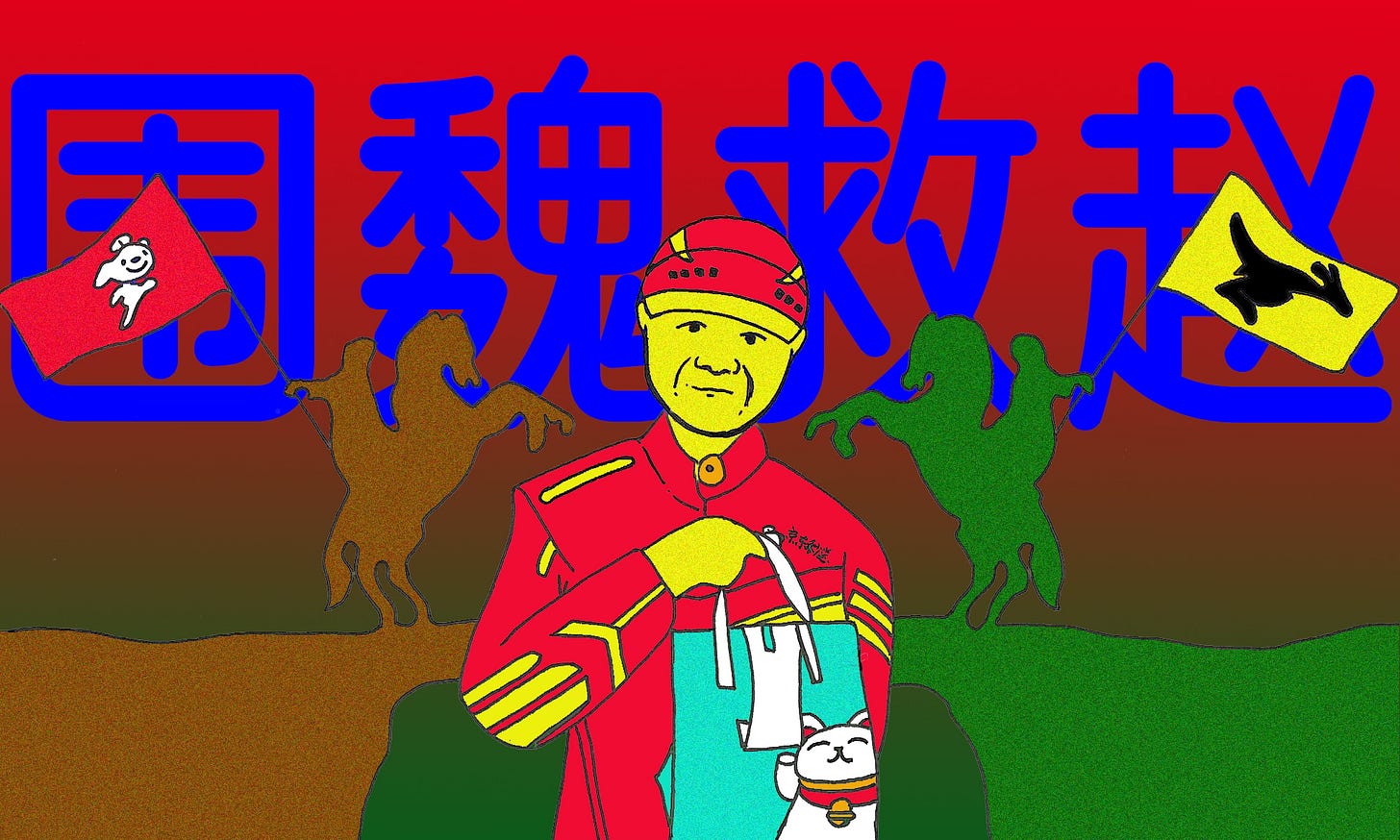Welcome to RealTime Mandarin, a free weekly newsletter that helps you improve your Mandarin in 10 minutes a week.
Subscribe today to get your fluency back, stay informed about China, and communicate with confidence in Chinese — all through immersion in real news.
This week, we’re diving into one of my favourite themes: how today’s fierce business battles in China echo the bloody wars of its ancient past.
The link? Language.
Many idioms used to describe modern corporate rivalries come from historical stories every native Chinese speaker just knows, but most learners don’t.
Without that context, we miss the full meaning, vivid imagery, and much of the fun of the language.
One period in China’s history which is fertile ground for Chinese language nerdery is the Warring States period (战国时期, 475–221 BCE), a time of intense warfare between seven states, before the eventual unification of China under the Qin Dynasty. Three of today’s idioms are traced back to that time.
Fast forward to today: a high-profile clash between two of China’s biggest internet companies grabbed headlines on April 21, when a video of JD.com (京东) founder Richard Liu (刘强东) personally delivering food orders went viral on social media.
The video was posted by a delivery driver and showed Liu dressed in a JD delivery uniform, carrying a food order. The driver shared in his post:
“I just received my first food delivery from Brother Dong — what an honour! I can now say I’ve been served by a billionaire.
Wishing JD every success in the future!”
接到了东哥送的第一单外卖,荣幸啊,也算享受过千亿大佬的服务啦,祝京东生意红红火火,蒸蒸日上!
In the following days, more photos and clips emerged of Liu personally delivering meals, and hosting a lively hotpot dinner for delivery riders, where, in typical "Brother Dong" (东哥) style, he said he would down his drink whenever one of his guests toasted him.
JD also used this carefully planned publicity stunt to announce plans to eventually hire over one million full-time couriers.
JD attacks Meituan
JD is China’s second largest e-commerce platform.
In February this year, the company made aggressive moves into the food delivery market. This was seen as a direct attack on Meituan (美团), the dominant player in the food delivery sector with over 60% market share.
JD announced a range of headline-grabbing policies aimed at addressing key complaints of customers and delivery drivers in this sector:
“charging zero-commission” (0佣金) to merchants who join their food delivery platform before May 1
“providing social insurance” (五险一金) for over 100,000 full-time delivery riders—a first in China.
Then in early April, JD intensified its efforts with its “10 billion yuan subsidy” (百亿补贴) campaign which provides coupons to customers to try JD’s new delivery service.
A week later, in an "Open Letter to All Food Delivery Riders" (致全体外卖兄弟骑手们的公开信), the company indirectly accused Meituan of reviving its “picking one side” (二选一) policy, which pressures riders to not accept orders from other platforms:
“In the past, riders could freely take orders across the three major platforms, which was essential to maintaining their income.
But due to certain platforms’ ‘picking one side’ (二选一) tactics, riders’ earnings have dropped by around 16%–25%. We sympathize with your situation and strongly condemn these illegal practices.
Some have denied doing this in public, but everyone knows they’re doing it behind the scenes.”
“过去,各位骑手都是在三大平台之间自由接单,才能保证自己的收入。因个别平台‘二选一’行为,大家的收入会降低16%-25%左右,我们对各位的遭遇深表同情,也对个别平台违法违规行为表示谴责。虽然有人明说不会做,但是大家都知道他们一定会暗暗做的!”[1]
Related
Meituan fights back
On April 15, Meituan officially launched Meituan Flash Delivery (美团闪购) as a standalone brand in the instant retail space, though the service had already been operating since last year.
Billed as a “next-generation 24/7 shopping platform,” it promises delivery within 30 minutes and now covers over 3,000 counties and districts across China, offering everything from electronics to beauty products.
It’s a direct attack on JD’s core business.
The company also hit back against JD’s accusations of forcing riders to “pick one side”, denying it was preventing delivery riders from taking JD orders.
The move makes strategic sense. According to a 2024 report, China’s instant retail market hit 650 billion yuan (roughly $90 billion USD) in 2023, growing nearly 29% year-on-year—far faster than the 11% growth in traditional e-commerce.
The sector is projected to surpass 2 trillion yuan ($276.8 billion USD) in value by 2030.
JD’s counter strike
Richard Liu’s recent high profile PR tactics are seen as an aggressive counter-attack against Meituan’s insurgency into his territory.
Behind that, his moves into Meituan’s core business are making ground. Since launching on February 11, JD’s food delivery service, JD Rapid Delivery (京东秒送), has expanded at pace.
By March 24—just 42 days in—over 450,000 merchants had joined the platform. By April 22, daily orders had surpassed 10 million, making a noticeable dent in Meituan’s dominance. For comparison, Meituan peaked at over 80 million daily orders in 2023.
Experts say one aim of JD’s attack is to distract and pressure Meituan from its incursion into e-commerce, ultimately protecting JD’s core business.
One observer describes the clash with an idiom from the Warring States period:
“JD’s aggressive move into food delivery is viewed as 'attacking Wei to save Zhao' — using food delivery to tie up Meituan and slow its expansion into instant retail.”
京东猛攻外卖的做法被外界视为“围魏救赵”,本质上是希望通过外卖牵制美团,减缓其在即时零售领域的扩张速度。
During the Warring States period, the State of Wei (魏) attacked its neighbour Zhao (赵). In desperation, Zhao called on another neighboring state for help. Together, they responded by launching a surprise attack on Wei’s capital, forcing the Wei army to retreat and abandon the invasion, successfully saving Zhao through a strategy of distraction.
Just as Zhao turned the tide over 2,000 years ago by striking at its enemy’s capital, JD’s founder Richard Liu is now using a similar strategy of distraction through attack, opening a new front in Meituan’s strategic heartland, food delivery, to protect his core e-commerce business.
And so far, it seems to be working.
But industry insiders caution this won’t be a short campaign. The real battle will be fought on two key fronts: winning over users and attracting delivery riders.
It will be a long war which won’t be decided by a single bold counterattack, or PR offensive.
So, who will come out on top? And what phrases do you need to follow this unfolding corporate battle?
That’s exactly what we’re exploring this week.
🎧RTM Podcast Preview
This week on the RTM Advanced podcast, we’re diving into three idioms of war (two are from the Warring States period):
逐鹿中原 zhú lù zhōng yuán - "Competing for control of the Central Plains", powerful rivals vying for dominance in a strategic heartland
群雄逐鹿 qún xióng zhú lù - "All heroes chase the deer", a vivid idiom describing a chaotic power struggle among many ambitious contenders
巅峰对决 diān fēng duì jué "Clash at the summit", a showdown between top opponents; the ultimate face-off.
Our editor, Zoe, explains these historical background, cultural connotations, and how to use them in modern contexts. All in beautiful Chinese (with transcript!).
Favourite Five
1. 腹地 fù dì
heartland, core territory
美团正式将即时零售的战火烧到京东腹地 - Meituan has officially brought the instant retail battle into the heartland of JD. [1]
2. 混战 hùn zhàn
chaotic battle, messy situation
这场混战已演变为全行业的生态价值比拼 - This chaotic battle has evolved into a contest of ecosystem across the entire industry. [1]
Related:
战火 zhàn huǒ – flames of war, conflict
硬仗 yìng zhàng – tough battle
暗战 àn zhàn – secret struggle, hidden conflict
3. 逐鹿中原 zhú lù zhōng yuán
power struggle, scramble for supremacy
两位重磅级选手的交锋,是商业模式的对决,也是即时零售领域的中原逐鹿 - The clash between these two heavyweights is not only a showdown of business models but also a power struggle in the instant retail sector. [1]
More: traced back to the Records of the Grand Historian (史记) by Sima Qian, from the Western Han Dynasty (西汉), which lasted from 206 BCE to 9 CE.
4. 群雄逐鹿 qún xióng zhú lù
many contenders vying for dominance, scramble for supremacy
在群雄逐鹿的万亿即时零售市场,实际还有更多玩家在持续发力 - In the trillion-yuan instant retail market where many contenders are vying for dominance, there are in fact more brands looking to join it. [2]
More: also dates back the Western Han Dynasty, and is found in the Records of the Grand Historian (史记).
5. 围魏救赵 wéi wèi jiù zhào
attack Wei to save Zhao, divert the enemy by attacking elsewhere, indirect strategy
京东猛攻外卖的做法被外界视为“围魏救赵”,本质上是希望通过外卖牵制美团,减缓其在即时零售领域的扩张速度 - JD’s aggressive move into food delivery is viewed as "attacking Wei to save Zhao" — using food delivery to tie up Meituan and slow its expansion into instant retail. [3]
Note: An idiom which is also found in the Records of the Grand Historian and later in the 36 Stratagems.
💡 Ready to get inspired to bridge the gap to real-world fluency? 💡
Every RTM+ post is packed with tools to inspire and help you get fluent.
It's designed to fit your busy life, your learning style, and your level—whether you’re “intermediate”, “advanced but rusty”, or “fluent with gaps”.
So, ready to get inspired and finally get back to real-world fluency?
Let’s jump in👇

















